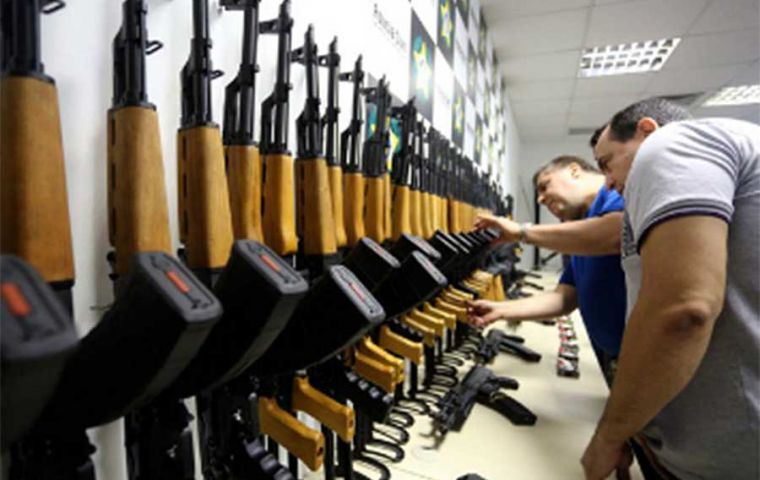MercoPress. South Atlantic News Agency
Rio to tackle criminal organizations' cash flow
 According to Dos Santos, 47% of all the rifles seized this year in the state’s municipalities were made in the US.
According to Dos Santos, 47% of all the rifles seized this year in the state’s municipalities were made in the US. Federal government and Rio de Janeiro State authorities agreed last week to create a joint working group to target the cash flow of criminal rings operating in the area, Agencia Brasil reported. The measure was adopted after three people were killed during a gunfight with Rio Police.
“The main focus here is territory and a probe targeting the financial workings of criminal organizations—which we think will have a positive result later on. If we deprive these organizations of their financial capacity, we deprive them of their ability to seize territory and buy weapons,” Rio de Janeiro State Public Security Secretary Victor dos Santos said.
“The idea is to outline a work plan that can change part of the reality we have, looking at the territories and thinking about retaking territory,” Federal Public Security Secretary Mário Luiz Sarrubbo added.
The fatal clashes in late October were the result of a police operation in Complexo de Israel, a group of favelas located along Brasil Avenue, to remove barricades and access a mobile telephone tower to re-establish the signal blocked by the criminal rings, which left around 130,000 customers without service.
According to the Military Police, the resistance of criminal organizations in the region was unusual. The shootout caused an interruption in traffic as well as in the circulation of trains and buses in the region. Local schools and a healthcare facility were also closed, Dos Santos explained.
Although this is not the first time the State of Rio de Janeiro State and the Federal Government joined forces, Sarrubbo believes this time around there could be more ground for optimism. “We want to know where this money is going, where it’s coming from. What is the economic cycle that dominates a given territory? How do so many rifles get to Rio de Janeiro? We’re now thinking much more about building an intelligence network that can understand the economics of crime in certain territories. Next, we should be able to replace that cash flow with the state’s economy, the legal economy, which generates income and taxes for the state,” Sarrubbo stressed.
According to Dos Santos, 47% of all the rifles seized this year in the state’s municipalities were made in the US. Hence, their route into the country is being tracked. “The challenge is not small. We have over 17 thousand kilometers of land border, plus more than 7,500km of sea border. Brazil is a country of continental dimensions. We see other countries with much greater resources than Brazil and they can’t even close a border because of immigration. So the difficulty is great,” he argued.




Top Comments
Disclaimer & comment rulesCommenting for this story is now closed.
If you have a Facebook account, become a fan and comment on our Facebook Page!